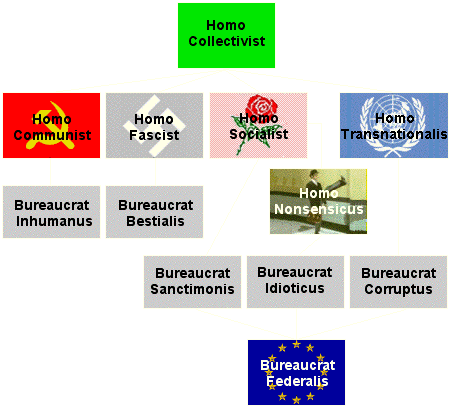There are just as many guns as there were before, except now people are angry that they have become criminals if they try to protect themselves, when American soldiers are more interested in protecting themselves than us.
– a trader selling weapons covertly in Sadr City, a Shia slum about the effect of sending the trade underground after the drive against gun markets in Baghdad last week.
|
|||||
|
In the last few days Britain has been depicted as the Paradise (soon to be) Lost in the clutches of the Federasts. Hope has been expressed that the British public may stir eventually and oppose Blair’s finishing touches on handing over the country’s sovereignty. The word “bovine” has been mentioned in descriptions of the UK public and the adjective is excruciatingly close to the truth. Only with a public as sleepy and ‘tolerant’ of the destructive antics of its politicians and bureaucrats as the British public has been, a particular breed of Homo politicus characteristic to these isles could have evolved. The species, known as Bureaucrat idioticus can be found in most governmental bodies, with highest density around local councils. In the last 50 years, it has adapted to a change in its original natural habitat from large forested ministerial departments to smaller, murkier quango marshlands. It belongs to a larger family of Homo collectivicus, sub-group Homo nonsensicus, indigenous to Great Britain, a genetic dead-end variation on Homo socialist (see below). However, the most famous branch of Homo collectivicus family is Homo communist, spread around the globe in the last century but currently experiencing an evolutionary hiatus. The ubiquitous Homo socialist, another influential branch, occupies the same evolutionary niche in its biological family as the cockroach in the insect family. Finally, the recently prospering Homo transnationalis has made some headway to the top levels of the British public institutions, the Government and the Courts. In the last decade, the Bureaucrat idioticus has been inter-breeding with Bureaucrat corruptus (its continental variety, as well as with its closely related Bureaucrat sanctimonis), which resulted in a virulent Bureaucrat federalis whilst facilitating deeper and wider entrenchment of Homo transnationalis in Great Britain. Oh, we are so ready for the EU primeval soup!  Note: The ‘family tree’ for Homo Liberalis (original meaning) to follow. In case our esteemed readership has not yet heard of FLAIR (the Far-Left Alliance of Indignant Revisionists) I have the pleasure to relay an interview taken from its case files. The interview was conducted by Barry Fest, a long-time associate and one-time student of Brummagem Groat, who agreed to interview his erstwhile mentor on behalf of FLAIR. The occasion was the publication of Dr. Groat’s latest book, I Dunno: The Working Person’s Guide to Postmodern Relativism by the Belverton University Press. Dr. Groat is professor emeritus of Talkmatics at Belverton.
For the full text of the interview visit The Radical Capitalist. A Telegraph opinion piece sums up the Home Office’s attempts to introduce compulsory ID cards in the UK:
Hear, hear… If you stay tuned, you will. Note: Everyone over 16 would be required to register with a national citizens’ database and would be issued with a personal number. The card is expected to carry core information about the holder, and biometric details such as fingerprints or iris patterns. The cost would be met by adding about £25 to the fee for a driving licence and passport. Anyone who knows anything about oppressive totalitarian regimes knows that nothing is as it seems and politically loaded public displays in such countries should be dismissed out of hand. This rule should have been applied to the images from Saddam ruled Iraq of convoys of taxis, with tiny coffins of dead infants strapped to their roofs slowly driving through the streets of Baghdad. The children were allegedly killed by United Nations sanctions. The moving scenes, accompanied by crowds of women screaming anti-Western slogans, were often filmed by visiting television crews. The western media, so shrewd and cynical when it comes to reporting on Western politicians and so naive and gullible when manipulated by dictators’ propaganda, provided valuable ammunition to anti-sanctions activists such as George Galloway, who routinely blamed Western governments for the deaths of 500,000 Iraqi children. And to the Guardian, who regularly reported on the beastly US and its minions as being responsible for the death of the (cynically paraded) babies and the on-screen grief of their mothers (mock grief of the members of the Iraqi Women’s Federation). As expected, the reality behind the Ba’athist regime’s dystopian methods is slowly coming out. In the case of ‘baby parades’ Iraqi doctors in Baghdad tell Charlotte Edwardes, a Telegraph reporter that UN sanctions did not kill the hundreds of infants displayed over the years – it was neglect by the former regime. According to the Telegraph, Iraqi doctors say they were told to collect dead babies who had died prematurely or from natural causes and to store them in cardboard boxes in refrigerated morgues for up to four weeks, until they had sufficient corpses for a parade. Many of the children died, they say, as a result of the Iraqi government’s own neglect as it lavished funds on military programmes and Saddam’s palaces in the knowledge that it could blame sanctions for the lack of medicines and equipment in hospitals and clinics. Dr Hussein al-Douri, the deputy director of the Ibn al-Baladi hospital in Saddam City, a Shia district in eastern Baghdad explains:
Asked what would have happened if he had disobeyed the orders, Dr al-Douri replied: They would have killed our families. This was an important event for the propaganda campaign. The government then ordered members of the Iraqi Women’s Federation, an organisation funded by the regime, to line the streets of Baghdad and wail and beat themselves in mock grief. Dr Amer Abdul al-Jalil, the deputy resident at the hospital, said:
What could they do? Not much, if they wanted to live and continue in their profession. But those who lapped up Saddam’s obvious propaganda for their own purposes should now recant their accusations as loudly as they heaped them. Let’s hear it, the Galloways of this world! Nice ‘fisking’ of Chirac’s preparations of G8 summit agenda by Collins on Pave France based on yesterday’s article in the Telegraph titled Chirac to embarrass Bush at G8 conference:
 I went to see The Matrix Reloaded last night, with two other Samizdatistas, who will no doubt share their opinions with you here. Based on my impressions, which ranged from boredom to frustration with the pomposity of the characters, I concluded that the film is so firmly wedged up its own backside that it is unlikely to re-emerge for the next sequel due in November. The Matrix Reloaded is a far cry from the original film’s mind-twisting plot, lacking its predecessor’s film noir atmosphere and plausible ontological riddles. David Edelstein of Slate has put it so much better:
I am sure this will upset many a Matrix affictionado. I too was genuinely looking forward to seeing the film. I loved the first one and still cannot comprehend how the same people managed to produce such stilted, pompous and at times boring sequel. Sure, the special effects are amazing and will enter the film-making history, just as the first one did. (The motorbike in the car chasing scenes did quicken even my pulse briefly.) But do they compensate for the feeble plot and insufferable dialogue? Well, I don’t think so. Yesterday I came across an interesting op-ed piece by Adam Nicolson of The Daily Telegraph in which he bemoans the decline of the art of conversation.
And then he really lays in to “whatever”:
He tracks down the culprit – the origin of this degenerate phenomenon lies with modern marketing:
Bravo! I agree wholeheartedly. I agree so much that I have quoted the piece almost in its entirety. The language of marketing is ludicrous and preposterous at best, crude and insulting to its audience at worst. My impression is that many companies are now stuck with costly marketing techniques, simply of out fear that if they do not spend a fortune on glossy brochures, flash animated websites, extortionately priced logo designs and re-designs, expensive advertising etc, they will not be taken seriously. Marketing as we know it may still be around not because people actually believe that such marketing works but because everyone does it as a token sign of a Serious Business. One thing I always hated about Big Companies was their increasingly disconnected and uniform marketing. When The Cluetrain Manifesto come along a few years ago, I breathed a sigh of relief. A breeze of fresh air, a tornado of common sense, it unveiled the Emperor’s naked and bloated body underneath the threadbare designer clothes. I am not holding my breath waiting for the end of marketing but I do hope that more and more businesses will see it for what it is and stop throwing money at the advertising industry and insulting their customers and employees with its meaningless marketingspeak. As a break from the usual tread-mill of Libertarian Principles, here is a story that best reflects the ‘quagmire’ Britain got itself into by having anything to do with the EU and the countries using its institutions to their advantage. Despite the ravenous inclusiveness of the European Union, the one thing there is no room left for is common sense. The European Court of Justice in Luxembourg ruled that Italian Parma ham must be packed and sliced in Parma itself to be marketed with its name of origin. The Asda supermarket chain has lost its legal battle to carry on selling Italian Parma ham, because it is packed and sliced in Britain. Asda’s Parma ham comes from Parma, but it is sliced and packaged near Chippenham in Wiltshire. Its delicatessen Parma ham also comes from Parma – but is sliced in its stores, in front of the customer. European judges have ruled that this is not enough under EU law to justify using the name.
According to The Daily Telegraph Asda claimed the Italian law was not part of EU law and could not be applied in the UK, but ham from Parma was registered under a 1992 EU rule protecting the use of geographical names on some products. The battle went to London’s High Court, which passed the matter to the Luxembourg judges for a ruling on the EU’s Protected Designation of Origin (PDO) law. The Parma ham producers’ association, which owns the trademark Prosciutto di Parma, has been seeking an injunction against Asda since 1997. Consorzio del Prosciutto di Parma won the battle despite judge’s recommendation to overturn the relevant European regulation and the advice the European Court of Justice received by one of its own members to invalidate the European Union rule. As Asda representative said last year:
In most cases the court follows such advice, for example, the European court’s advocate general delivered a similar opinion in a case brought against a company that grates the hard Italian cheese Grana Padana in France. Not this time though. When you next eat your Parma, you can rejoice in the knowledge that it has been subjected to the traditionally tough quality control by its Italian producer. I suppose there is a first for everything… Walt Disney will introduce self-destructing DVDs for ‘rent’ this August in a pilot project to crack a wider rental market. The discs, dubbed EZ-D, become unplayable after two days and do not have to be returned. They stop working after a change in colour renders them unreadable, starting off red, but when taken out of the package and exposed to oxygen, the coating turns black and makes it impenetrable by a DVD laser. The technology is impervious to hackers as the mechanism which closes the viewing window is chemical and has nothing to do with computer technology. However, the disc can be copied within 48 hours, since it works like any other DVD during that window. The only purpose behind this wasteful production of DVDs I can see (think of all the waste from the useless discs!) is Walt Disney having a go at the rental market in an attempt to recoup the return on films released on DVDs. Presumably licenses or other means used to control the rental market are not good enough for them. For the customer the benefit is marginal, I no longer have to remember to ‘return’ the disc, whose only use thereafter will be as a tacky coffee mug mat. In fact, there will cease to be rental market as such, as there will only be two kinds of DVDs I can purchase. The expensive ones that last and the cheap ones that will play only for 48 hours. It is not clear whether they will be distributed by a similar network of ‘rental’ shops. It certainly makes economic sense to do so, since one of the benefits of renting a DVD or a video is the convenience of being able to do so close to one’s home and at any hour of the day. I do not have sufficient detail to take a firm position on this one. My gut reaction is that any attempt to control markets by restricting either supply or demand eventually blows up in the face of companies whose delusions of market power got better of their business sense.  British academic communists suffer from ideology, which is a brain virus. It takes every natural, logical and honest thought and turns it into a version of itself. So everything becomes political. A person is either good (communist) or bad (capitalist), poor and trodden-upon (good), white and privileged (bad) and so on. American communists, however, live in an intellectual and informational vacuum. So they make it up as they go, creating the most marvelous conspiracy theories as they go along. One of the news headlines today was about the discovery of mass grave in Mahawil area in Iraq. So far remains of more than 3,000 people have been found but Iraqis fear up to 15,000 people reported missing in the area may have been buried there during Saddam’s government crackdown on Shi’ites when they launched an uprising in 1991. Reuters reports:
To all those protesters whose righteous hatred for the United States and Britain was declared out of self-proclaimed desire for peace. Is this the kind of ‘peace’ you wanted to preserve when you cried “not in my name”? Araya Hussein carried the remains of her husband in a bag away from the site weeping.
Explain to this woman why your righteous wrath was directed at Bush and Blair but not at Saddam. Explain how according to your warped view of the world Saddam has ‘the right’ to rule Iraq and kill thousands without any fear of retribution. Explain how you can end up supporting an evil and oppressive regime and distance yourself from the long awaited liberation. Damn you and your coddled, self-centered and twisted minds. You have caused enough misery and suffering by your irrational and irresponsible opposition to anything that might bring freedom to those parts of the world where free expression is an unknown concept. Perhaps you should change your slogans and cry for ‘peace of mind’, your minds that is, in the face of the gruesome truth emerging from Iraq. 
The mass murders in Iraq have been stopped… but not in your name |
|||||

All content on this website (including text, photographs, audio files, and any other original works), unless otherwise noted, is licensed under a Creative Commons License. |
|||||



